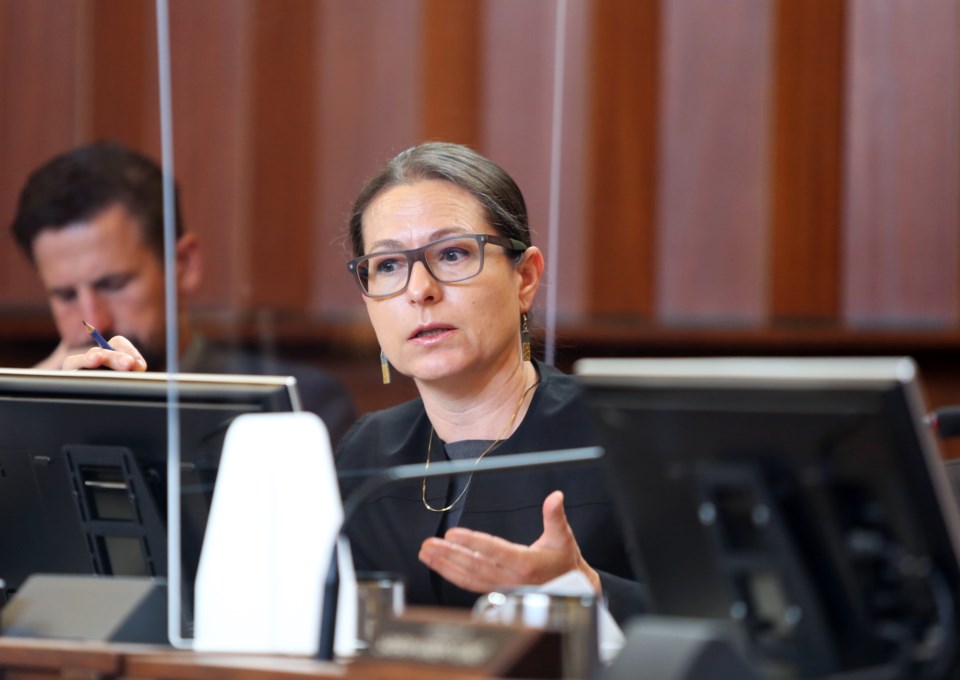Vancouver city councillor Lisa Dominato could find herself in one of the hottest seats in B.C. politics these days, as she vies to be nominated as Metro Vancouver’s board chair.
“I am interested in putting my name forward for chair. I've been encouraged by a number of directors to consider that and so it is my intention to put my name in at next Friday’s special meeting,” Dominato told Glacier Media Friday.
On June 28, the board of directors of the Metro Vancouver Regional District will vote on a replacement for outgoing chair George Harvie. Delta city council removed Harvie as Delta’s representative on Metro Vancouver, which also removes him as chair.
So far, Dominato is the only board director to confirm their bid; Burnaby Mayor Mike Hurley is also understood to be considering the position but told Glacier Media Friday he was unavailable to comment other than to say he is “undecided.”
The chair earns $105,000 as a base salary and oversees board meetings as their chief responsibility. The chair also plays a role as spokesperson on board positions and is more involved in intergovernmental relations. The chair can also play an influential role by determining standing committees and so-called task forces.
Today, there are three task forces for: financial planning; the George Massey tunnel replacement and the North Shore wastewater treatment plant.
Dominato, a Vancouver councillor since 2018 and former public servant in the provincial government, is a past vice-chair of the liquid waste committee, which is also in charge of receiving information on the North Shore plant.
It is that project that has propelled the regional district into a tailspin of controversy of late, after the district announced the project is now $2.8 billion over budget and will cost closer to $4 billion when complete.
“My priority is to address the public concerns over transparency, accountability, and overall governance of Metro Vancouver,” said Dominato.
“I want to take steps to restore public confidence and trust in the management of our major capital infrastructure, as well as deliver value for taxpayers.
“Those are two areas I'm very interested in focusing on, particularly as we're grappling with, as you're well aware, with questions around the North Shore wastewater treatment plant,” said Dominato.
Over the past three months, the board has deliberated on how the cost overruns at the under-construction sewage facility are apportioned, sparking a debate that exposed competing local and municipal interests playing out at a regional level, leading to concerns around regional cohesion.
For instance, as it stands, liquid waste projects are mostly paid for by the property owners served by them, with less than half the costs going to all households in the region.
The board ultimately decided to largely keep that structure in place, resulting in sewage costs for North Shore property owners going up by $590 a year for the next 30 years (on top of an average of $484 of current sewage costs) and costs to other properties only rising by between $80 and $150 annually for the next 15 years.
Dominato was among the minority that wanted to see a more even burden placed across the region for the controversial plant.
Board members have hinted at an anticipated debate about whether future projects are billed evenly across the region regardless of their location.
Glacier Media asked Dominato if it is in Vancouver property owners’ interests to move to a more regional billing strategy, given the Iona wastewater treatment plant, which serves Vancouver, is slated for an upgrade now widely cited by directors as costing $11 billion.
“I think reflecting on that conversation that we had as a board, it was about looking at a more equitable manner to address the large capital projects. This is not about one specific project. It's about operating as a region — we are a regional federation — and recognizing that our communities are unique,” said Dominato.
“What I think is really critical is that we work together and work collaboratively to deliver the really critical services of this region, which is: clean drinking water, safe sewer systems, regional parks and we have a pretty significant housing portfolio delivering affordable housing.
“At the end of the day, I think the public wants us to be working together to deliver on on those services,” said Dominato.
Asked how she will shore up cohesion on the board, Dominato said she has a track record of bringing people together.
“I appreciate and understand the uniqueness of the member municipalities, but also the differences, and that we have a lot of shared interests and common goals,” said Dominato, who said as chair she would introduce a governance committee responsible for the overarching governance of the board.
The board consists of 41 directors appointed from 21 municipal councils in the region, one electoral area and Tsawwassen First Nation.

